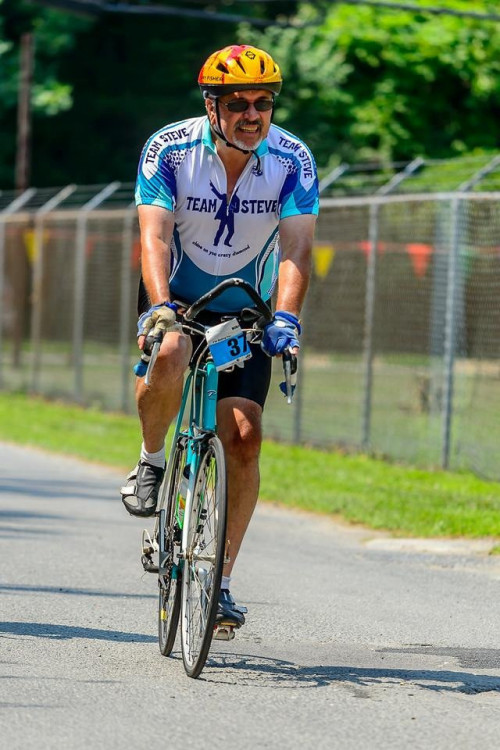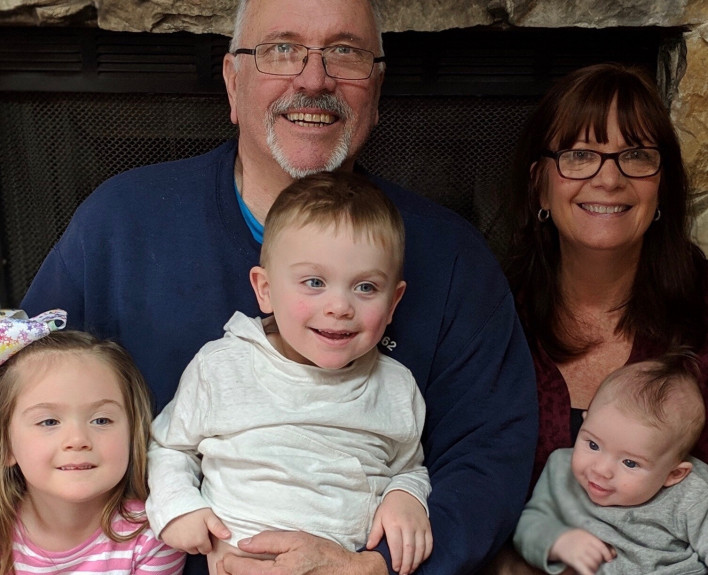October 2012
I was diagnosed with renal cell carcinoma (RCC), the most common type of kidney cancer, by my general practitioner at my yearly checkup. My bloodwork came back a little off, and I had lost weight and felt kind of lethargic, but I didn’t really think anything of it. My doctor sent me to get a simple ultrasound, and lo and behold, there it was: cancer on my left kidney. I went to the hospital for my first surgery, where they took out that kidney. And that was the beginning.
February 2013
After surgery, they wanted to put me on a clinical trial of Votrient (pazopanib), a targeted therapy that interferes with cancer growth. It was only a one-year trial, and it did keep the cancer from spreading while I was on it. However, some of the side effects were crazy: It turned every hair on my body white! Dawn and I have three sons and three grandchildren—I grew a beard and was Santa Claus for Christmas.
June 2013
I participated in my first American Cancer Society Bike-a-thon in Philadelphia. I biked with Team Steve, which started after my daughter-in-law’s cousin, Steve Crowe, died from acute myeloid leukemia in 2005. I’ve done the bike-a-thons as often as I can in between recovering from all my surgeries.

Ed Doelp has biked as part of Team Steve in the American Cancer Society Bike-a-thon in Philadelphia since 2013.Courtesy of Ed Doelp
May 2014
Three months after I stopped taking Votrient, the RCC showed up in my right lung. I had a small section of my lung removed, about 3 centimeters. That surgery, compared to the kidney surgery, was a walk in the park, and we thought that was that.
November 2015
I’d been getting CT scans and MRIs every three months to see what was going on. About a year and a half after my lung surgery, the scans showed little spots on my liver: The RCC was back again.
December 2015
This time, they performed a bland embolization, a procedure that cuts off blood flow to the tumor. That was wild. While I was awake, they stuck a catheter up my groin and tried to encapsulate the cancer to stop blood from getting to it, with the goal of starving the cancer so it would die. But that just pissed off the renal cancer even more.
April 2016
The RCC had gone crazy in my liver, so I had to have liver surgery. They wound up taking 60% of my liver during a 12-hour operation. That was a one-shot deal, but my liver did regenerate to 80% and was functioning quite well—we thought.
November 2016
I was still getting my checkups and my CT scans and MRIs every three months when an enlarged lymph node appeared on my liver. It was really big. The surgeon said, “Ed, what do you want to do?” And I said, “Get it out, get it out!” So they opened me up exactly where they cut me open to take out part of my liver—same scar and everything—and removed the lymph node, and we thought that was all good.
At this point, we were trying to keep ahead of the renal cancer, trying to cut it out of me. Just to be on the safe side, they also removed my appendix. But at some point, the surgeon said, “Ed, we cannot cut you open anymore. If it comes back, we need to look for other options.”
March 2017
It seemed like every three months, something happened. With renal cancer, you never know where it’s gonna go. That’s what makes it scary. This time, the cancer showed up as lesions on my liver again. It really liked my liver for some reason. There were enough of the lesions and they were big enough that I qualified for another clinical trial at Fox Chase Cancer Center in Philadelphia.
It was communication between doctors that got me hooked up with this study. They’re always willing to trade information back and forth to help people, and that’s what it’s all about.
The first clinical trial was just a one-year deal, and the cancer came back rabidly. With my RCC, chemotherapy and radiation just doesn’t work. I thought, What other options did I have? I already knew I couldn’t have surgery again. So of course I enrolled in the new clinical trial.
April 2017
I started the clinical trial of Keytruda (pembrolizumab). It’s two pills—Inlya (axtinib)—twice a day, then an infusion of Keytruda every three weeks at Fox Chase. The side effects were zero! Nothing! I’m very happy about that.

Ed Doelp with his wife, Dawn, and their three grandchildrenCourtesy of Ed Doelp
July 2017
The treatment worked quickly. I was getting CT scans and MRIs every six weeks, and about three months into the trial, my cancer was gone. They couldn’t find a trace of it on my liver. Needless to say, Dawn and our whole family were going crazy—we were jumping for joy. We were very, very happy.
March 2019
I’m still on this clinical trial and doing my thing. Every three weeks, I go to Fox Chase and get my infusion, which only lasts a half hour. I’m feeling magnificent, and the doctors and the whole medical staff are incredible. They’re unbelievable. I’m just so proud to be part of this team.
In November, it will be seven years since I was first diagnosed with kidney cancer. It’s been a long journey. When you have this disease—and since I’ve had it over such a long time period—you get used to it, and you just expect you have to do these things to get cured. It just becomes part of your life. But it’s not a bad thing. To me, I look at it as a good thing, because treatment—especially this medicine—is saving my life. It’s unbelievable, this immunotherapy. I’m honestly thrilled I got a chance to extend my life even more.
I’m living a normal, happy life. I’m still working. I want to retire next year. I don’t let the cancer get into my head or anything; I know that I am being taken care of by the best people in the world.
For anyone with cancer, I recommend a clinical trial. Cancer is no joke. You have to get on it, and get on it quick, because if you don’t, you’re gonna have problems. You have to be very proactive.
Basics
Renal cell carcinoma accounts for more than 90% of all kidney cancer cases, most of which are classified as clear-cell cancer. Kidney cancer has few symptoms during its early stages, and many people already have metastatic disease by the time they are diagnosed.
Standard treatment for kidney cancer involves surgery followed by targeted therapies that interfere with enzymes that play a role in cancer cell growth and blood vessel development. The immunotherapy drugs Opdivo (nivolumab), used with or without Yervoy (ipilimumab), and, most recently, Keytruda (pembrolizumab), used with Inlyta (axitinib), are also approved for kidney cancer.
To learn more about kidney cancer, click here.
For a complete list of approved treatments for kidney cancer, click here.







1 Comment
1 Comment